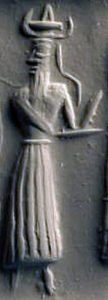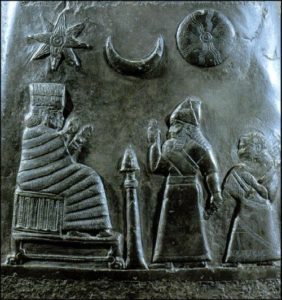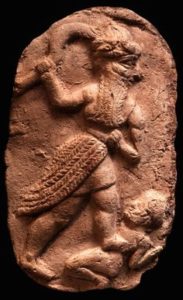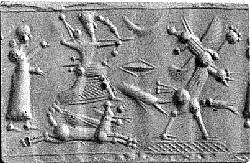(Texts: All Artifacts, Color Coding, & Writings in Bold Type With Italics Inside Parenthesis, are Added by Editor R. Brown, not the Authors, Translators, or Publishers!)
(gods in blue … mixed-breed demigods in teal)
Nabopolassar, king of justice, shepherd chosen by the god Marduk,
creation of the goddess Ninmenna (Ninhursag) — the exalted princess, the queen of queens —

 (Nabu, Nanaya / Tashmetum, & Babylonian king)
(Nabu, Nanaya / Tashmetum, & Babylonian king)
protégé of the god Nabû and the goddess Tašmētum (Nabu’s spouse),
beloved prince of the god Ninšiku (unidentified, Ninsikila?):
When, during my childhood, (although) I was a son of a nobody,
I was constantly assiduous towards the shrines of the gods Nabû and Marduk, my lords;
(my) mind pondered about making their rites secure and properly administering their kidudû-rites;
my attention was set on truth and justice.
The god Šazu (unidentified), the lord who knows the hearts of the gods of heaven and netherworld,
the one who constantly observes the ingenious behavior of the people,
for me — the child who could not be found among the people —
he observed my intention(s) and made me pre-eminent in the land where I was created.
He called (my) name for dominion over the land and people, made a good lamassu walk beside me,
(and) allowed (me) to successfully undertake everything that I did.
 (Nergal & disloyal earthling)
(Nergal & disloyal earthling)
He made the god Nergal, the almighty one of the god, march at my side;
he killed my enemy (and) cut down my opponent.
(As for) the Assyrians, who from distant days had ruled over all of the people
and had made the people of the land suffer under its heavy yoke,
I, the weak (and) powerless one who is assiduous towards the lord of lords (Marduk),
with the powerful strength of the gods Nabû and Marduk — my lords —
I barred them (lit: “their feet”) from the land of Akkad and had (the Babylonians) cast off their yoke.
 (Ninhursag & airborne Ninurta)
(Ninhursag & airborne Ninurta)
At that time, (as for) E-PA-GÌN-tila, the temple of the god Ninurta that is inside Šuanna (Babylon),
which a former king before my time had had built, but had not finished its work,
I set my mind to the renovation of that temple.
I mustered the workmen of the gods Enlil, Šamaš (Utu), and Marduk
and (then) I made (them) carry hoe(s and) imposed (on them the carrying of) basket(s).
I finished the work on th(at) unfinished temple.
I roofed it with broad beams (and) installed tall doors in its gates.
I made that temple shine like the sun and made (it) as bright as day for the god Ninurta, my lord.
Any king in the future, either a son or grandson who comes after me,
whom the god Marduk names for dominion over the land:
Do not set your heart on feats of might and power,
(but rather) be assiduous towards the shrines of the gods Nabû and Marduk
so that they may kill your opponent(s).
The god Marduk, my lord, examines the mouth (and) observes the heart
(so) whoever is true to the god Bēl (Marduk) his foundations will endure
(and) whoever is true to the god Son-of-Bēl (Nabû) will live for ever.
When that temple becomes dilapidated and you repair its dilapidated section(s),
find an inscription (written) in my name (and) place (it) with your inscribed objects.
By the command of the god Marduk, the great lord whose command cannot be changed,
may the fame of your name be established for ever.